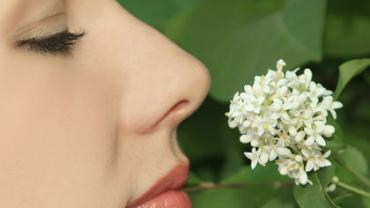
"
If you've ever experienced an old pleasant or unpleasant memory triggered by a familiar odor you'll appreciate the power of the sense of smell and its relationship to memory and emotion. An odor stimulates chemoreceptors in the nose which pass these sensations on to the brain through electrical impulses. The brain then interprets the received signals translating them into specific odors and thus helping us to identify and subsequently recognize certain smells.
It should not be surprising then that smell is intimately linked to the regions of the brain that process emotion and associative learning. The olfactory bulb of the brain is part of the limbic system and has the responsibility of translating sensation into perception. The limbic system is the most ancient and primitive part of the brain and includes the amygdala and the hippocampus both of which play a huge role in behavior relating to mood and memory. As the sense of smell has an effect on memory mood and learning it wouldn't be a stretch to assume that certain smells could contain within them certain therapeutic powers.
Aromatherapy therefore is the application and use of essential oils of plants for the therapeutic purpose of improving certain emotional physical and more esoterically spiritual states.
Research has looked into the physiology and possible therapeutic value of aromatherapy and has discovered what may be some clinical value from exploring this obscure restorative treatment.
A Korean study evaluated the physiological response to the inhalation of some essential oils and found that their odors were able to improve both systolic blood pressure and markers of autonomic nerve activity.
As mentioned earlier as the sense of smell is associated with areas of the brain that is linked to emotion several studies have looked into the effects of aroma therapy on mood and various aspects of mental health. In another Korean study performed among female college students aromatherapy using lavender essential oil was shown to have a positive effect on sleep and depression measurements. In a Japanese sleep study use of the same essential oil used before bed time improved sleepiness upon awakening. Remarkably use of aromatherapy massage even had a positive effect on the self-esteem and anxiety in elderly adults.
Regarding other prospective therapeutic qualities of using aromatherapy going beyond mood the next most logical benefit that one would assume would be on the pulmonary system itself. While it is well known that essential oils of many plants and herbs have antimicrobial properties with direct contact of the oil other studies have shown that the inhaled treatment of the oil may appear to have anti-microbial and lung supportive properties as test subjects experienced significant reductions in severity and duration of pulmonary infections.
In other areas aromatherapy has shown interesting results. Use of the remedy was shown to be effective in decreasing the symptoms of menopause and dysmenorrhea.
Finally use of aromatherapy seems to have some effects on pain modulation as well.
The Effect of Lavender Oil on Stress Bispectral Index Values and Needle Insertion Pain in Volunteers
While this form of therapy is not without its critics or controversy it appears that the low incidence of side effects and toxicity warrants some discussion in certain clinical applications.
Michael Fuhrman D.C.